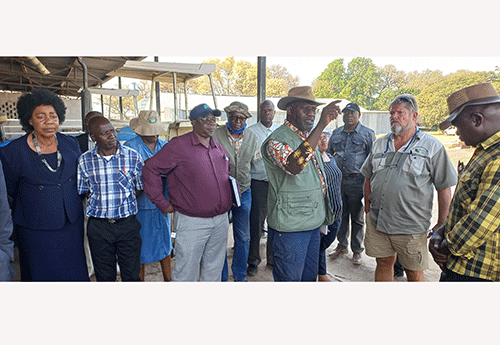RUNDU – Member of parliament Tjekero Tweya is dismayed at the deplorable state of green scheme projects in the Zambezi, Kavango East and West regions, saying the line ministry does not take these projects seriously.
Speaking on behalf of the Parliamentary Standing Committee on Natural Resources, of which he is the chairperson, Tweya told New Era that things are not working out at the green schemes, especially the ones under government management at Kalimbeza in the Zambezi region; Ndonga Linena, Shadikongoro and Uvhungu-Vhungu in Kavango East; and Sikondo in Kavango West.
He stressed that a lack of maintenance was the big challenge at the state-run projects, where equipment is rundown and abandoned to rot.
“They have become dumping sites of all this equipment. Some are brand new; they just used it for one harvest, and from there no spare parts were available and no technician to fix them. Those are the disturbing issues that we found,” he narrated after the committee’s visit to the green schemes.
Tweya added that agricultural implements, tractors and harvesters, including the various machines bought by government to process oil, mill flour, plough the fields and harvest, are either broken or just not used due to a lack of funds from the agriculture ministry for maintenance and/or other inputs.
“All these facilities are there, and it is not being utilised. It’s not because the farm managers or the workers don’t want to work, but those in authority have told them not to work, to stop growing sunflowers for us to get oil, and now we are subjecting our people who previously used to afford cooking oil to high prices from the international market,” he lamented.
Tweya noted that the complaints of the public have merit when they ask how the country can rely on Ukraine for grains when there are lands and green schemes not being utilised, forcing Namibians to pay high prices for food being determined because of the Ukraine and Russian conflict.
The MP further said state farm managers indicated to the committee that some procedures introduced are cumbersome.
“A simple example, and this we picked up in all the three regions, is that during harvesting, they would request approval from head office to employ temporary workers to assist. But that request would take months to be attended to and, in the meantime, birds would help themselves to the sunflowers at Shadikongoro, and rice, maize or other harvests at Kalimbeza. By the time approval comes, the birds had ruined the yield,” he continued.
The committee was further informed that at some green schemes, like Ndonga Linena, small-scale farmers have not been paid for the last harvest which they sold through the project, and it has put them in debt with Agribank in terms of loan repayments.
Also at Ndonga Linena, no production had taken place for the past four years. Workers, including the manager, are thus paid for nothing.
Tweya then asked: “No,w if there is no money for production, how come the authorities have money to pay people for doing nothing?”
Traditional leaders in the areas of the green schemes likewise told the committee that in the past, locals would get temporary jobs and be given the chance to pick leftovers after the project had been harvested.
“Now that the projects are not operational, they don’t have work to earn money to buy food from shops. So, they basically lost all, and their land was given to government in hopes to benefit. Thus, the traditional authorities are not getting their cut from these projects,” he elucidated.
Tweya said the traditional authorities are now asking the land back to rather give it to their people to plough their crops to feed themselves.
– jmuyamba@nepc.com.na


